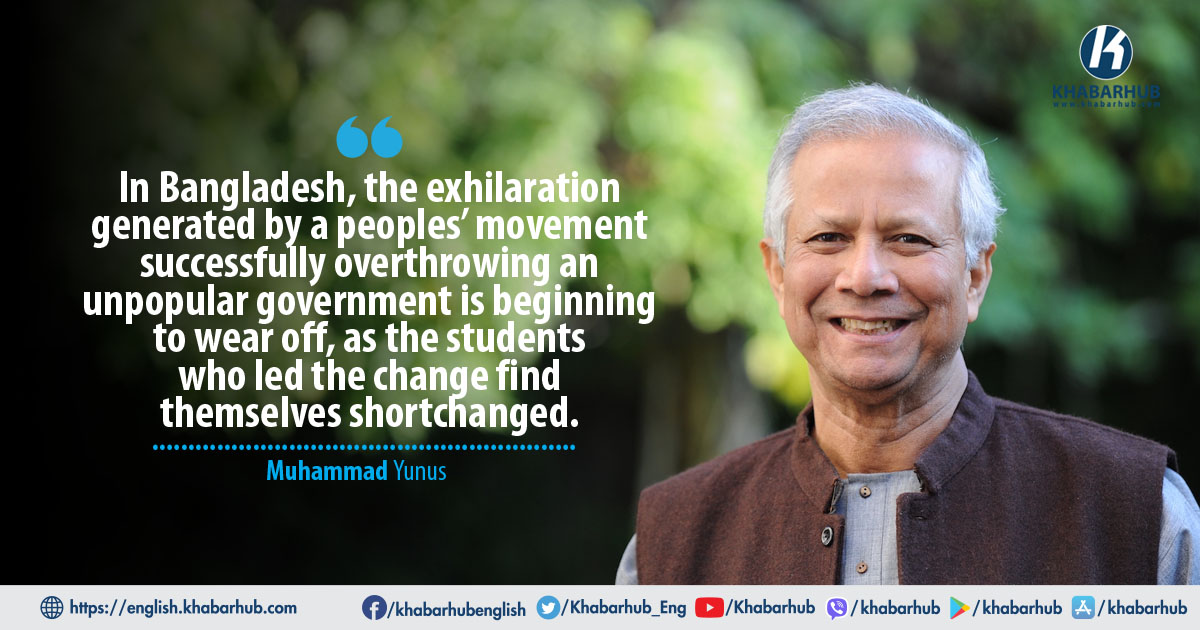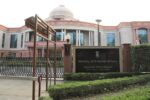Bangladesh experienced a significant political shift led by student protests. These protests, initially sparked by opposition to government job quota reforms, escalated into a movement against Prime Minister Sheikh Hasina’s government, who resigned and fled to India.
Nobel laureate Muhammad Yunus was appointed to lead an interim government.
It’s a pivotal moment for Bangladesh, but the youth which played a crucial role in shaping the events now appears to have been shortchanged.
As the interim government faces crucial issues like corruption, governance reforms, and restoring peace in the country, any prospect of collaboration that was expected with youth increasingly looks bleak.
The student leaders are not actively involved in governance and decision-making processes of the interim government.
Rather, students are being used to maintain order in Dhaka, direct traffic and help to restore normalcy in the absence of police. Classes remain suspended, their futures are on hold.
Yunus is banking on the support he enjoys among the country’s youth, but Michael Kugelman, director of the Wilson Center’s South Asia Institute, says that support may have an expiration date.
While it was being projected that their involvement is crucial in shaping the future of Bangladesh and addressing key issues like corruption and governance reforms, their active participation in the country’s governance is not forthcoming.
The BNP’s actions indicate their desire to influence the political transition. Its members are already resenting the popularity enjoyed by the students.
So they are alleging that while protests are possible for students, they lack political and administrative experience, which will make it difficult for them to navigate the complexities of governance and policy-making.
Given their prominent roles, student leaders might be targets for political violence or intimidation, posing significant personal risks.
This dynamic adds another layer of complexity to the political landscape in Bangladesh, and will affect the stability and future of the interim government.
The primary mandate of Bangladesh’s interim government should be to ensure free and fair elections.
But Chief advisor Yunus’ office has said a free and fair election will take place as soon as reforms are made in the election commission, judiciary, civil administration, and security forces.
Reforming Bangladesh’s institutions is therefore a massive task for the interim government.
However, it has not yet come up with any outline of reforms, according to the chief advisor’s office. M Sakhawat Hossain, who served as home advisor to the interim government for three days, told DW that structural reforms are underway, although no details have been made public.
So far ‘reform’ has only meant changing personnel at the helm of state institutions.
This includes forced resignations of judges of the Supreme Court, vice chancellors of universities, chiefs of police and other security agencies and even school headmasters.
Media outlets are being attacked and purged of those considered close to the Awami League.
Such vengeful reprisals can be no substitute for structural reform of the institutions of state.
Students are already beginning to face pressure from established political parties and interest groups, which could influence their decisions and actions.
The Bangladesh Nationalist Party (BNP) and its allies have seized on the youth discontent to revive their own anti-government movement.
They see the student-led changes as an opportunity to challenge the long-standing dominance of the Awami League.
The BNP particularly has indeed been very active in the current political scenario.
Rumeen Farhana, former member of parliament and central international affairs secretary of the Bangladesh Nationalist Party (BNP) told DW that this interim government differs from previous caretaker governments.
It is questioning the interim government’s de-facto leadership role, demanding that it should clarify if it is an interim neutral government, or as a revolutionary interim government.
The ostensibly non-political chief adviser to the interim government, Muhammad Yunus is yet to present his plans to the nation even after two weeks of Sheikh Hasina fleeing the country.
BNP is leveraging the student-led movement to challenge and push for a neutral interim government to ensure free and fair elections, arguing that such conditions are not possible under the previous administration.
Yunus is banking on the support he enjoys among the country’s youth, but Michael Kugelman, director of the Wilson Center’s South Asia Institute, says that support may have an expiration date.
Kugelman is of the opinion that the longer Bangladesh’s interim government stays in power, the higher the chances of the military assuming a more definitive role in the country’s politics.
He says, “With this continued vacuum and with these uncertainties and with no clear path toward an election and interim government that continues to be there, the army is, I think, in a position to, it would have been, by default, playing more of a political role.”
The interim govt has also made it clear that it has not taken any decision yet on the length of its tenure but that it wanted to first finalise its reform agenda.
“If you don’t want reforms, that is a separate discussion. Now, there is no reason to get restless… .” said Syeda Rizwana Hasan in charge of the environment ministry.
Incidentally, while forming the interim government in addition to his position as chief adviser, equivalent to interim Prime Minister, Mohd. Yunus has assigned to himself 27 ministries including the crucial defence, information, education, energy, food, and water resources.
And Asif Mahmud Shojib Bhuyian, one of the coordinators of the quota reform protest key in leading the regime change in Bangladesh, has been assigned an insignificant position as adviser to the sports ministry!
Students have clearly been sidelined, with token representation in the interim government.
The reality is that if the students refrain from forming a new political party or fail to put together an electoral machinery to contest elections, they diminish any chances of cashing in on the euphoria of the movement.
Meanwhile, student leader Nahid Islam, appointed in the interim government as the Post and Telecommunication Adviser, has denied reports of party formation.
The agenda for the Anti-Discrimination Student Movement according to Nahid Islam is “to formulate the outline of the future Bangladesh through discussions and dialogues with the people. We have no plans to form a political party at this moment. The students will act as a socio-political force to preserve the spirit of the revolution and the government will work towards restructuring the state according to the aspirations of people.”
The ostensibly non-political chief adviser to the interim government, Muhammad Yunus is yet to present his plans to the nation even after two weeks of Sheikh Hasina fleeing the country.
Yunus’s interim government is grappling with multiple law and order challenges due to the unprecedented situation in the country.
Since Hasina’s fall, an absence of law enforcement officials on the streets have seen people set up nighttime patrols to protect their neighbourhoods and the property of vulnerable minorities, mainly Hindus.
The reality is that if the students refrain from forming a new political party or fail to put together an electoral machinery to contest elections, they diminish any chances of cashing in on the euphoria of the movement.
With nearly 40% of the population under 18, there is a pressing need to turn this demographic into an asset rather than a burden.
The interim government, and any future leadership, must address the growing inequality in society and lack of employment opportunities for young people. The euphoria of revolution rarely lasts long. In Bangladesh, the exhilaration generated by a peoples’ movement successfully overthrowing an unpopular government is beginning to wear off, as the students who led the change find themselves shortchanged.









Comment